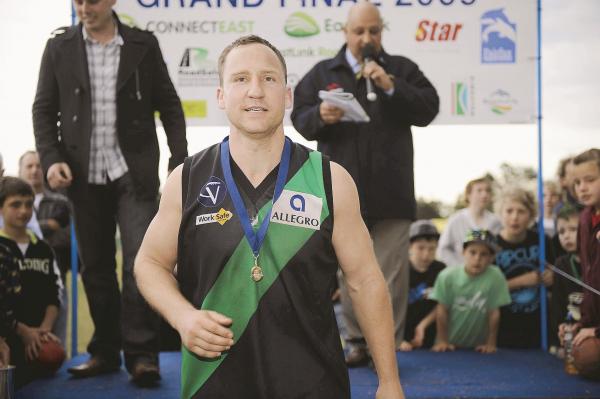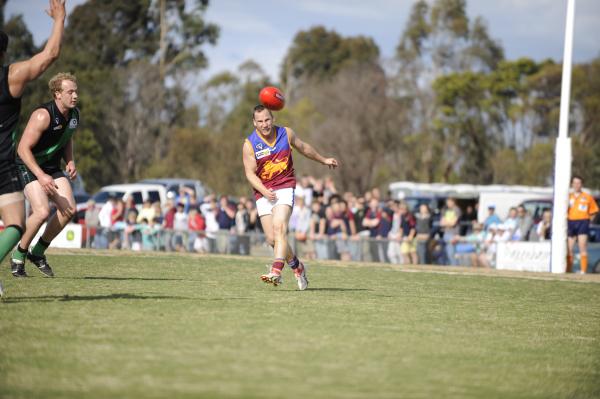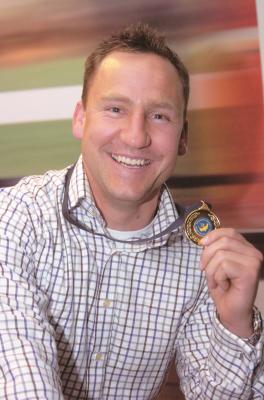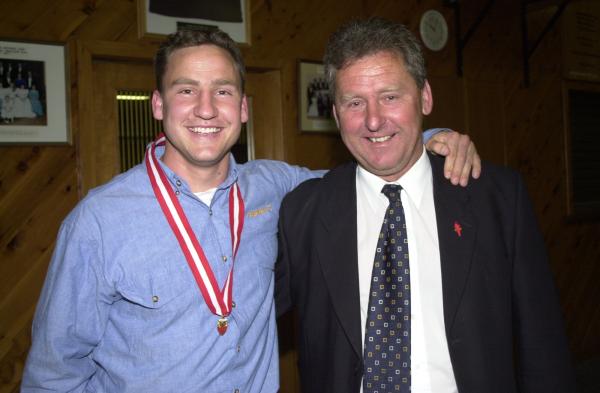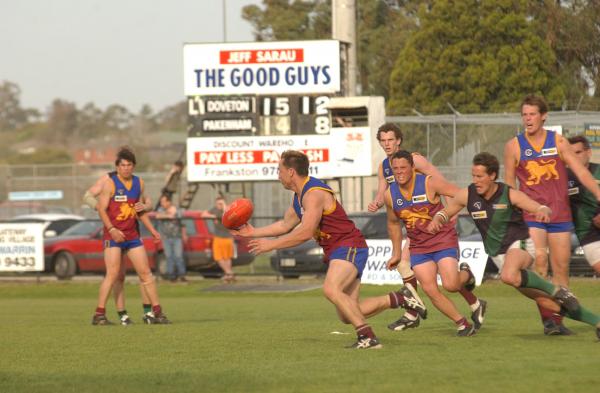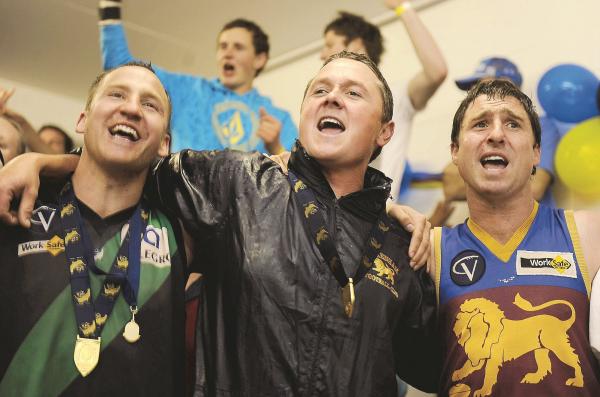
By David Nagel
Dan O’Loughlin was a very rare breed of footballer who was always one step ahead of the pack – with four league best and fairest awards and an equal number of premierships a glowing endorsement of his overall standing in the game.
His football tool-kit was impressive, with a laser-sharp mind, extreme fitness levels, classic left foot, and a fierce competitive streak moulding him into one of the most envied footballers in the region.
If you ask him – his football journey is boring – but that is far from the case with the born-and-bred Pakenham boy making his mark as one of the best midfielders of his generation.
Add the title of dual premiership captain to an already impressive CV, and O’Loughlin’s impact, on the Pakenham Football Club in particular, will stand the test of time.
He won a league best and fairest award in under-15s, senior club best and fairests at Warragul, Pakenham and Tooradin-Dalmore, and rubbed shoulders with some of the biggest names in the game during his wonderful football career.
Dan O’Loughlin was born in mid-November, 1975, the second of four children for Steve and Barbara O’Loughlin – a young brother for big sister Elly, with brother Tom and youngest sister Bessie still to make their way into the world.
He was born at the Pakenham Bush Nursing Hospital and spent the first six months of his life on a dairy farm in Nar Nar Goon before the family moved to the big smoke…James St in Pakenham!
“I spent the first 18 years of my life in James Street, and you couldn’t ask for a better childhood,” O’Loughlin explained.
“We lived around the corner from our mates, the Boyd’s, Holland’s, Pearson’s and Wouters and we were typical kids, hanging out at each other’s house and causing mischief.
“The old creek ran through the middle of James Street, where we lived, and we couldn’t wait for winter, the creek would flood, we’d jump in on a lilo and go from one end of Pakenham to the other.
“Our parents would have freaked out if they knew we were doing that sort of thing back then.”
O’Loughlin went to primary school at St Pat’s in Pakenham before his secondary school days were spent at St Francis Xavier in Beaconsfield.
Dad Steve was a private tennis coach in Melbourne, teaching at some of the most exclusive postcodes in town.
“We had a tennis racquet in our hand religiously, we loved it, and I remember getting up early to train with dad to see how far I could go with my tennis,” Dan said.
“It was tennis, football and basketball back then…most of our friendship group were petrified of a cricket ball.”
The O’Loughlin clan already had a close link to football, with mum Barb a member of the famous Sweeney family from Narre Warren.
Barb’s dad Pat Sweeney was famous for his long-term involvement in both the Narre Warren junior and senior football clubs.
Sweeney Reserve in Narre Warren is named in the family’s honour.
O’Loughlin started his football career in the under-11s at Berwick. In his first game had to be escorted to the half forward flank…having no idea where the position was on the ground.
But he would quickly improve, his knowledge of the game and skills, and in his last year at Berwick would tie with Justin Leppitsch – the future Brisbane star – in the club’s under-13 best and fairest award.
It was then back to Pakenham, for under-15 football, where he began his long and decorated association with the club.
O’Loughlin would win the league best and fairest award in under 15s and a short time later would play his first senior game for the club. In a sign of things to come, he booted four goals on debut, before being dropped the following week to make way for incoming senior coach Graham Hall.
“Back then it was all about enjoyment, I had absolutely no idea if I was good or bad at football…we just loved it, and that stood out above everything else,” he said.
“With Tom pretty close in age, we had a football in our hands every day of the year, that helped us both a lot I think.”
O’Loughlin was 17 when he spent a season with the Gippsland Power in 1993.
Travel to and from Morwell for training was tiresome, but he loved the experience of playing on some of the biggest and best grounds in the AFL.
He also had a taste of the ultimate, playing in the curtain raiser to the first night-final, between Carlton and Essendon, in front of 80,000 people at the MCG.
“I remember I was in class, doing Legal Studies, and the principal walked in and said Essendon had called and I needed to finish school early and get to the MCG,” he recalls.
“There are two things I remember from that game. One, I couldn’t catch Michael Christian, and he was getting old and slow, and then late in the game I kicked one out on the full and got jeered by a packed MCG.”
Despite his inauspicious debut at the home of football, he had caught the elite bug.
His aspirations became clear after he wrote a letter to all Victorian AFL clubs expressing his interest in taking his football further.
Geelong offered him the opportunity to do a full-pre-season in 1994.
“For a Geelong supporter, to move to Geelong and be running around with blokes like Gary Ablett, Billy Brownless, John Barnes and Paul Couch was an unbelievable experience,” he said.
“I fluked a few touches in my first practice match against the Bulldogs, but then I tagged Ben Allan against Hawthorn the next week and he had 40 touches by half time…that was the end of me at Geelong…but I loved the experience.”
Still just 18 years old, O’Loughlin ramped up his training regime, and combined that with a strong competitive streak to make his mark at Pakenham in 1994-95.
“I was a nut with my fitness and I’d run daily, as long as I could and as far as I could,” he said.
“I’d go to the gym every day if I could. I probably wasn’t doing exactly the right training for football but I was fit – that’s the one thing I could hang my hat on.
“And competitive, yeah, ridiculously so, and I still am to this day, even in business life.
“I put that down to the competitive environment that we grew up in. Even if we were playing backyard cricket I didn’t want to go out and then watch the Pearson’s bat all day.”
After two solid years at Pakenham, O’Loughlin would test himself in one of the best country football leagues in the state, in the Latrobe Valley League with Warragul in 1996.
He would win the best and fairest award in his only season at the club and then take up an offer to play for North Adelaide in 1997.
“The year at Warragul was fantastic, loved the football, but the year in Adelaide wasn’t so great,” he said.
“I had a bad run with injuries and that probably affected my mindset and I didn’t enjoy it. The year shaped me as a person a lot more than a footballer and I did learn a lot about myself.”
Towards the end of 1997 O’Loughlin had a visit from Darrell and Barb Hardy, who he had worked for in their Mitre-10 store in Pakenham since the age of 18.
“I started in the timber yard but I was hopeless, couldn’t read a tape measure, couldn’t use the chainsaw…I was costing him (Darrell) money,” he said.
“They had inklings from mum and dad that I wasn’t happy in Adelaide, so they caught up with me on their travels. They offered me a job in the family business, back in Pakenham, this time in the office, and I never looked back.
“The Hardy’s have been like a second family for me.”
Now back in Pakenham, with a good job, and happy in life, O’Loughlin would begin to build his football legacy, playing in the Lions’ 1998 premiership win over Garfield under then coach Peter Bennett.
“He and I just clicked instantly, I just loved his demeanour, his no fuss attitude and everything he brought to the table,” O’Loughlin said of Bennett.
“It was his way or the highway, you either bought in or he would work you out pretty quickly, but he brought the best out of me through that period.
“We had a really good mix, the blokes coming towards the end like Adam Ladbrook, Andrew Wellwood and Lachie Hillard.
“Then the middle bracket like Dale Brice, Tim Bayard and Tim Cantwell, then us younger blokes like Jock (Michael Holland), Tom, myself and the Wouters boys.
“Socially we were thick as thieves, all of us, it didn’t matter about age, we were so united.”
Pakenham was just three points up at three-quarter time in the ’98 grand final, before Ladbrook, Hillard, Matt Shores and O’Loughlin would boot last quarter goals to see the Lions home to victory.
But the early spark came from Tom O’Loughlin, who kept the Lions in the hunt with two important goals.
“I’m obviously brother biased, but he’s unfairly played that card as my brother,” Dan said openly and honestly, with a touch of seriousness in his voice.
“I’m a four-time premiership player at Pakenham, so is he, if that’s how we measure our success then we’re on a par as far as I’m concerned.
“His determination was fantastic I thought he was a terrific footballer, an important player in every team who gave his absolute all.
“He was defensively a lot better than me, a great tackler, but had a yappy mouth that got him in a lot of trouble (chuckles).
“He’s never been bitter towards my individual success at all and has enjoyed those successes as much as I have.”
O’Loughlin would finish third in the Breheny Medal of 1998, behind Cora Lynn’s Matt Irwin and Nar Nar Goon star Nick Collins, but would really put his stamp on things in a very busy 2000.
He would win his first Breheny Medal, despite playing six games for Carlton reserves, captain a Pakenham premiership, earn a wing position in the Team of the Year (TOTY) and try and to turn things around as captain after the mid-season departure of senior coach Chris Denereaz.
“That was a big year,” he said,
“Tom, Andrew Boyd and I had just started a road trip to Foster in New South Wales and Shane O’Sullivan rang while were in the car and told me that Carlton would like to sign me for a year,” O’Loughlin recalls.
“Lincoln Withers (Pakenham teammate) had already been at Carlton, but had lost his licence, so I think they signed me to be his chaperone (laughs).
“Linc was a god in there. Blokes like Fraser Brown and Craig Bradley would be asking what he did on weekends…they loved him. His locker was next to David Parkin’s – mine was next to the toilet (laughs).
“By that stage I was 24 and knew my level, I was going to be an ok country footballer at best, not an AFL star.
“I was there to enjoy a pretty unique experience and come back to Pakenham a better footballer.”
O’Loughlin’s time at Carlton saw him become the fittest he had ever been, but that didn’t stop Carlton reserves coach Ross Lyon from giving him one of the best sprays of his career.
“It was half time, we were getting flogged by Essendon, he went through every single player in the team and got to me and said ‘O’Loughlin, you are the fattest, slowest player to ever pull on a Carlton guernsey’.
“I was a bit shocked because I’d only been on the ground for two minutes and I was the fittest I’d ever been (laughs).”
O’Loughlin’s football in 2000 was special, polling 21 votes from just 12 games to win his first senior league medal.
“Everything was perfect from a fitness point of view at that stage, and it didn’t happen often but there were moments that year where I remember my fitness assisting me more than ever,” he said.
“But let’s be honest, I wouldn’t have been winning Breheny Medals if players like Sonny Wouters and Jock Holland weren’t putting the football in my hands.
“I wasn’t a Lincoln Withers, who won medals off his own back by the things he did, I was reliant on others and needed assistance to be the player that I was.”
And the departure of Denereaz, and subsequent premiership win, made the 2000 season one of the most memorable of his career.
“It had been brewing for a while,” O’Loughlin said of Denereaz’s departure.
“I’m open in my praise for Chris Denereaz. He was someone that I liked because he challenged me personally, with every aspect of my game, my fitness, my leadership, the way I played, he challenged me in a way I hadn’t been challenged before.
“He would send us on a 10k run, then send us again, he was brutal.
“But when you’ve got blokes on the tools for 10 hours a day obviously there’s going to be some pushback. He was ex-Navy so it was 100 percent buy-in or he was out.
“He called it himself, because not everyone could deliver what he was asking for, but I loved his coaching.
“We had blokes in our team that had never had opposing views before and we saw it differently. It was probably the first time we had been challenged that way as well…there was certainly the potential for division.”
Ash Green would be appointed the replacement coach, and Joe Lenders Chairman of Selectors, and between them, with O’Loughlin as captain, they would build on a wonderful platform built in the early part of the season.
“That was a pretty special premiership…we had won nine games straight when Chris left and it had huge potential to unravel, to be remembered as a missed opportunity.
“We had to overcome so much to win it and we were lucky there was one bloke on the ground doing things a little bit differently to the rest of us that day.”
Withers would play a blinder in the 2000 grand final, and even a four-time league best and fairest winner was often in awe during that 43-point win over Beaconsfield.
“He took you to another level, you definitely felt a few inches taller if you had Lincoln Withers on your side,” O’Loughlin said.
“We were lucky, we had Sonny Wouters, Jock Holland, Joel Padley, Travis Murphy, we had players like Lincoln, but he was a little bit different to everyone else.
“It’s hard to explain, but he just had a magic about him.”
O’Loughlin capped off a great season by captaining the West Gippsland Football League in representative games that year, a concept he held close to his heart.
“I had a real passion for interleague and what it stood for, and what it provided players, and I got really disenchanted with players who didn’t buy in,” he said.
“I thought of it as a privilege to test yourself at that level and to get to know players from your own league. I’ve still got strong relationships with players I played interleague with as an 18-year-old.”
Pakenham would be knocked out in the first-semi final by Garfield in 2001, but a 25-year-old O’Loughlin would become the first player in 15 years to go back-to-back in the Breheny.
He polled 19 votes to win by one from his great-mate Holland, who he shared many great experiences with throughout their playing days.
“That isn’t a relationship that was born from playing football, we were, and we still are, like brothers,” O’Loughlin explained.
“We’ve known nothing else except having each other around and my relationship with Jock remains as strong as it was when we were five years old.
“I have great respect for Jock as a footballer as well, he was a very good player and great leader.”
O’Loughlin would earn a third premiership, his second as captain, when the Lions made a successful transition to the Mornington Peninsula Nepean Football League (MPNFL) in 2002.
“It was a new challenge and our first game in the MPNFL was against Doveton at Doveton,” he recalled.
“We all saw Daniel Charles for the first time and none of us had seen a specimen like him, and we thought ‘what have we got ourselves in for here.
“But what a club Doveton turned out to be with great people like Charlesy and Stuie Batten.
“We made a commitment that year as a playing group that a car-load would stay until stumps when we were the away team. We did that deliberately to create an off-field connection with the MPNFL clubs.”
The 2002 finals series was full of big moments, with Sonny Wouters saving O’Loughlin from an embarrassing moment in the preliminary final of that year.
“The last thing Joey (coach Joe Lenders) said to me before we ran out was make sure you kick with the wind if you win the toss – it was probably a six-goal breeze,” O’Loughlin recalls.
“I won the toss and decided to kick against the breeze. ‘Bully’ Wilson was the Doveton captain and gave me a nice old spray…something about being an arrogant little so and so.
“Sonny took a great mark and saved us that day in the dying minutes.
“I told Joey I lost the toss and only had the courage to tell him the truth a few years back.”
Pakenham, as a whole, would have a huge impact in its first season in the MPNFL, winning the premiership and Withers claiming the Norm Walker Medal as the best player in the league.
O’Loughlin would finish fifth behind his teammate, but earned his own special place in history by being named the inaugural captain of the Team of the Year.
In 2003, O’Loughlin would win his first Norm Walker Medal, polling 21 votes to win by three from Doveton’s David George.
The Lions would make the grand final but lose convincingly to Beaconsfield by 47 points.
O’Loughlin would then surprise many by transferring across to Tooradin-Dalmore to take on the role as playing coach for the 2004 season.
“It just seemed like the natural attrition of leadership, coaching interested me, I was getting older, Tooradin was in a different league at the time, so there was no conflict playing against Pakenham,” he said.
“I really liked Tooradin as a club, and still do, just a lot of things aligned at the time.
“It was probably the hardest decision I remember having to make, but once I committed to it and got involved in the club, they were four of the fondest years of my career.
“They’re just a genuine, united club, they listened, they wanted to learn and develop, the attitude was unbelievable.”
O’Loughlin would win his fourth league best and fairest award in 2006, at age 30, polling 23 votes to win from some familiar faces, with George second, Withers third and Holland in fourth position.
O’Loughlin would also be selected as coach of the Team of the Year.
After three years coaching, the gifted left-footer would have one more season at Tooradin-Dalmore under new coach Tom Hallinan in 2007, before returning to Pakenham to coach his home club in 2008.
The Lions would go through the season undefeated, with 16 wins and no losses, but would lose the second semi-final to Narre Warren by 41 points.
It set up a preliminary final clash with Keysborough, a team the Lions had rolled by 135 points in their only clash that season.
But the Lions, overwhelming favourites, would squander a 37-point lead at three-quarter-time, allowing Keysy to kick 7.4 to 1.1 in the final term to eventually go down by two points.
O’Loughlin still to this day takes full responsibility for the loss.
“That came down to poor coaching,” he said bluntly.
“To be 37 points up at three-quarter time and lose the game, we just made some really bad coaching decisions in the last quarter.
“It cost us immensely, and I take full responsibility for that.
“I was shattered, I was not a good person to be around, but I’m really pragmatic and I would have been over it very quickly. There’s no point worrying about things you can’t change – always look forward.”
For all his brilliance as a footballer, O’Loughlin is blunt when self-assessing himself as a coach.
“I don’t think I was a great coach and I’m ok with that…I didn’t get the sack after that game but I knew I wasn’t going to be coaching again the following year.
“That would have been an injustice to everyone involve at Pakenham if I thought I could fix it in six months.
“We needed Jock to come back and give us the ultimate prize and that’s what happened…it all got righted the following year.”
If 2008 was a low-point for O’Loughlin, then 2009 was a perfect tale of redemption.
Redemption, not as a coach, but as a player, whose position had been questioned heading into his mid 30’s.
“There were a few murmurings going around that it might be time for me to pull the pin, but Jock came to me at the start of the year and mentioned he wanted me to do a few tagging roles,” O’Loughlin said.
“At first I thought ‘Is this what it’s come to’, but Jock explained it was time for others to stand up and for me to play a different role.
“I played a lot up forward that year and didn’t play a lot through the midfield, only during the finals series.
“Jock spoke to me about Doveton’s opinion of me, that my time was done, and he gave me the opportunity to start in the middle in the grand final.”
The four-time league best and fairest winner would remind everyone of his standing in the game, playing a starring role in a 15.14.104 to 6.10.46 triumph that would right the wrongs of 12 months earlier.
At 33, O’Loughlin would be announced as the best player on the ground in a grand final, sharing that honour with his Lions’ teammate Dean Blake.
The four-time premiership star would then play one more season at the club, before ending his brilliant career at age 34.
“The four premierships are the highlight, with absolute classic blokes that I will be friends with forever and a day,” he said.
“And to be able to say that I’ve captained two premiership teams is pretty special, that’s right up there as well.
“The individual awards are nice, but those premiership memories are what I’ll remember most.”
O’Loughlin is happily married to Amy and has two children, Daisy and Ted, who are currently dabbling in netball and football respectively.
He worked for the Hardy family for 21 years, at Retravision and The Good Guys, and is now a Managing Director, alongside business partner Matt Ketteringham, at Barry Plant Real Estate in Berwick, Drouin and Pakenham.
The man known as ‘Doodles’ did it all as a footballer…he is a humble champion who was always one step ahead of the pack!

